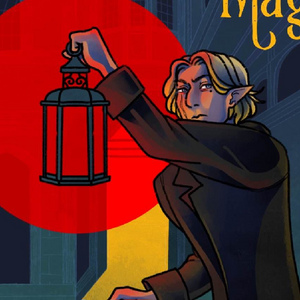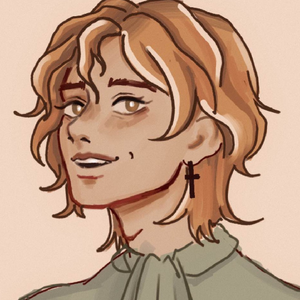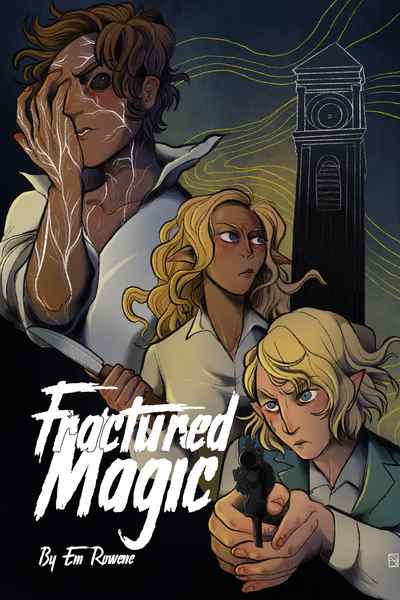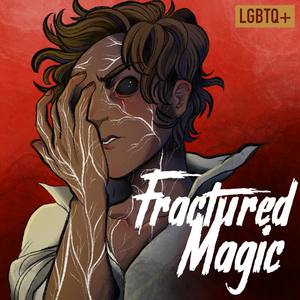Roman had wasted too much of his morning worrying over his new acquaintance. It was just silly. The brother of a Unity Magistrate, who had everything in the world and could easily get what little he didn't, needed neither Roman's pity nor his concern. But sympathy was rarely rational, and Roman's thoughts kept drifting Gareth's way despite his best efforts.
Did he regret saving the man? No. Was he happy about doing Unity a favor? Absolutely not. Now knowing Gareth's surname, given the chance, would he save Gareth again? Roman shifted uncomfortably at the thought, at the inevitable answer: of course he would. Even after all Unity had done to him, all the ways it had hurt him, he still would.
He jumped when a pair of fingers snapped in front of his face.
“Oy! Are you listening to me?”
Roman blinked and sat back. The fingers belonged to Cahrn, the leader of the theatrical troupe Roman had been traveling with. A large man with a dark beard and a darker scowl, Cahrn existed in a perpetual state of grumpiness, gruff everywhere except for on stage. Roman would never forget the time he'd played Burgess in Only for the Roses, a notoriously saccharine role in a notoriously tender tragedy. The Act III soliloquy, with all the raw vulnerability Cahrn had poured into it, had Roman bawling in the back row like a child. But off-stage, the man bothered Roman. His only saving grace was that he was fun to bother back, something Roman took frequent advantage of. Hiding his irritation behind a sweet smile, he said, “Sorry, Cahrn. I was distracted by how dashing you look in that costume.”
Cahrn scowled and crossed his arms, though he dropped them again when the troupe's costumer, who was busy re-pinning Cahrn's cloak hem, tsked disapprovingly. “Don’t start. This concerns your girl, so pay attention,” Cahrn said. “I passed her on my way here. She's practicing again.”
“Is that a problem?” Roman asked.
“Of course it's a problem. The show is tonight. If she keeps pushing this late, she’ll only tire herself out. You understand?”
Roman sighed and spun idly on his stool while Cahrn watched, unimpressed. “Sure, sure. If you need target practice the day before a battle, it’s already too late. I don’t have to be an actor to understand that much.”
“Been in many battles, have you?”
Roman smirked at Cahrn. He wasn’t supposed to know, but he knew the troupe had placed bets on what he’d been doing before he started traveling with them. While highwayman and alchemist were Roman's favorite guesses, Cahrn's money was on soldier — and quite a lot of money it was, too. Roman had been toying with Cahrn for weeks, referencing imaginary battles and making up army lingo, never confirming or denying anything. Somehow, Cahrn still hadn't realized Roman was only teasing him. “It’s just a metaphor.”
Cahrn let out a slow breath through his nose. “Go tell Dinara to rest.”
“I'll do my best, but you know how hard she is to reason with when she's set on something.”
“Then distract her. You're better at improvisation than half my trained actors; you should manage. It's only for a few hours.”
“Are you saying I could be an actor?” Roman asked, pressing a hand to his heart. “I knew you'd ask me to join the Players permanently if I only stuck around long enough! I'm flattered, Cahrn, but I can't afford to be tied down at the mo—”
“Just go,” Cahrn growled. “And make sure she's at the theater by five for hair and makeup.”
Roman laughed and ducked out of the tent before Cahrn could say any more. The walk to Dinara from here wasn’t far — through the Players’ camp to the empty festival grounds. On the way, he passed Julian, the Players' fiddler, pianist, and musician of many instruments tapping at a light drum from Troas. Julian's wife nestled on the ground beside him, asleep with her back resting against his side. Further, down the path, a group of Dinara's friends played footbag. Before they could spot him, Roman ducked down a side path and hopped the fence into the empty Festival Grounds. It was always strange, walking around this place when the festival was closed: all the empty stages and covered booths, the wide, open path and total quiet. Still, it meant a straight shot to the Webhon Players’ stage.
He arrived just in time to see Dinara fall.
She stood alone on the Webhon Players' stage, dancing for the empty stands while her mentor Tabia watched. Dinara twirled, then jumped, soaring for a beautiful moment before she rolled her ankle and hit the ground hard. Roman broke into a run, but before he'd even reached the back row of seats, Dinara was pushing to her feet again, limping only a few paces before shaking it off.
Tabia stood to help, but Dinara waved her off. “I'm alright,” Roman heard her say. She rolled her ankle experimentally.
Fortunately, Tabia climbed up onto the stage anyway, kneeling and taking Dinara's ankle carefully in her hands. Dinara held Tabia's shoulder for balance and looked past Tabia to the empty benches, her dark eyes meeting Roman's as he came down the center aisle. She was beautiful — even injured, even wearing raggedy practice clothes and covered in a sheen of sweat. Embarrassed, she grimaced and gave Roman a small wave. Roman smiled and waved back.
“It's fine, Tabia, really,” Dinara said, sweeping her dark curls out of her face, and Roman wondered how long they’d been out there, that Dinara was making mistakes like this. How long had she been pushing herself?
“You're nervous,” Tabia accused, her back still to Roman. “It's making you sloppy.”
“I'm tired,” Dinara corrected while Roman settled on a bench in the third row. At what was presumably a stern look from Tabia, she laughed, loud and frantic. “Fine, of course I'm nervous! I'm performing for Unity tonight, Tabia! What else am I supposed to be?”
“Confident,” Tabia said, simply. “Don't think about them. Think about the story, about Edith. Would it help to hear about her again?”
Eyes wide, Dinara nodded and backed away so Tabia could take the stage for herself, the older woman only pausing to tie her long braids behind her with a scrap of cloth. When she finally turned toward the empty benches — and Roman — she frowned, displeased. “You shouldn't be here.”
“Is it true you've met Edith?” Roman asked in lieu of an apology. It was a common rumor among the Players, but he'd never heard it confirmed.
Tabia ignored Roman, instead stepping into the dance Dinara had just fumbled. She jumped, then landed smoothly. Roman noticed Dinara flinch, noticed her drop her gaze to the ground. She'd been struggling with the role since Cahrn cast her: not because of her own skill, but because of Tabia. Edith, the spirited heroine of Cenhelm, was Tabia's legacy. From the way the Players told it, always in whispers and never when Tabia or Dinara were around, she was the one who made the role famous, decades before. Not only had she performed it for Unity, she'd performed it for kings and queens. She'd performed it for Edith herself. It was her role, not Dinara’s.
But mortality was a tragedy, and Tabia was getting too old to believably play the young ingenue. If they'd been performing for a small village off the beaten path, things would be different. For Unity, everything had to be perfect. But that didn’t make Dinara feel any better.
“You have her heart,” Tabia said, moving through the variation with ease. She slipped deeper and deeper into character, her usual jaunty sway fading away. “But your fear is holding you back, Dinara. Edith's story is about trusting your heart and doing whatever you must to follow it, even when it's difficult.”
Dinara nodded, looking miserable.
“Had Edith let fear rule her, she wouldn't have discovered the assassination plot. Ellaes wouldn't have given her the power to stop it. She wouldn't have saved Unity and, subsequently, the world.” As she spoke, Tabia finished the dance and dipped into a bow, a smile on her generous lips. Finally, she met Roman's eye. “I have indeed met her. Just once.”
Roman moved up a row so he could hear better. “Must've been a while ago.”
“Are you calling me old, boy?” Tabia asked. Roman opened his mouth to backtrack, maybe even to flirt and soften her up, but Tabia chuckled. “You wouldn't be wrong. My grandmother was a maranet; I'm even older than I look.”
Dinara shot Roman a warning look. “You don't look old at all,” she said.
“Sweet of you, pet, but I know it's not true.”
“Did Edith talk at all about Ellaes?” Roman asked, taking advantage of Tabia's good mood while he could.
Tabia shook her head. “She called it a 'narrative embellishment.' Either it was made up, or she had to deal with people believing it was for so long that she no longer believes it herself. But enough of this,” Tabia said, holding her hands out to Dinara. Reluctantly, Dinara took them. “More practice will not do you any favors, pet. Go rest, and remember: stories mean the most when you, the one doing the telling, are moved by them as well. Don't be so hard on yourself. Just go where Edith leads you.”
Dinara nodded, a new, determined gleam in her eyes. “I will. I'm sorry for taking so much of your time today, Tabia.”
“Nonsense. That's not something you ever need to apologize for.”
While Dinara came down the steps toward Roman, he stood and gave her a lazy salute. “I'm glad you're done, because Cahrn sent me here to stop you. Something about needing a break. You know the meaning of that word, don't you, Di?”
“Har har,” Dinara said. When she held out a hand, Roman took it without hesitation. “What were you doing with Cahrn? Did you become best friends while I wasn’t looking?”
“Mm. We gossiped while I helped him braid his beard.”
Dinara mock-gasped. “Poor Cahrn! You never get the tension right.”
“That shows what you know. He appreciated my skills.”
Dinara laughed, then patted Roman’s hand. “Let’s go home, Roman. I’m tired.”












Comments (2)
See all